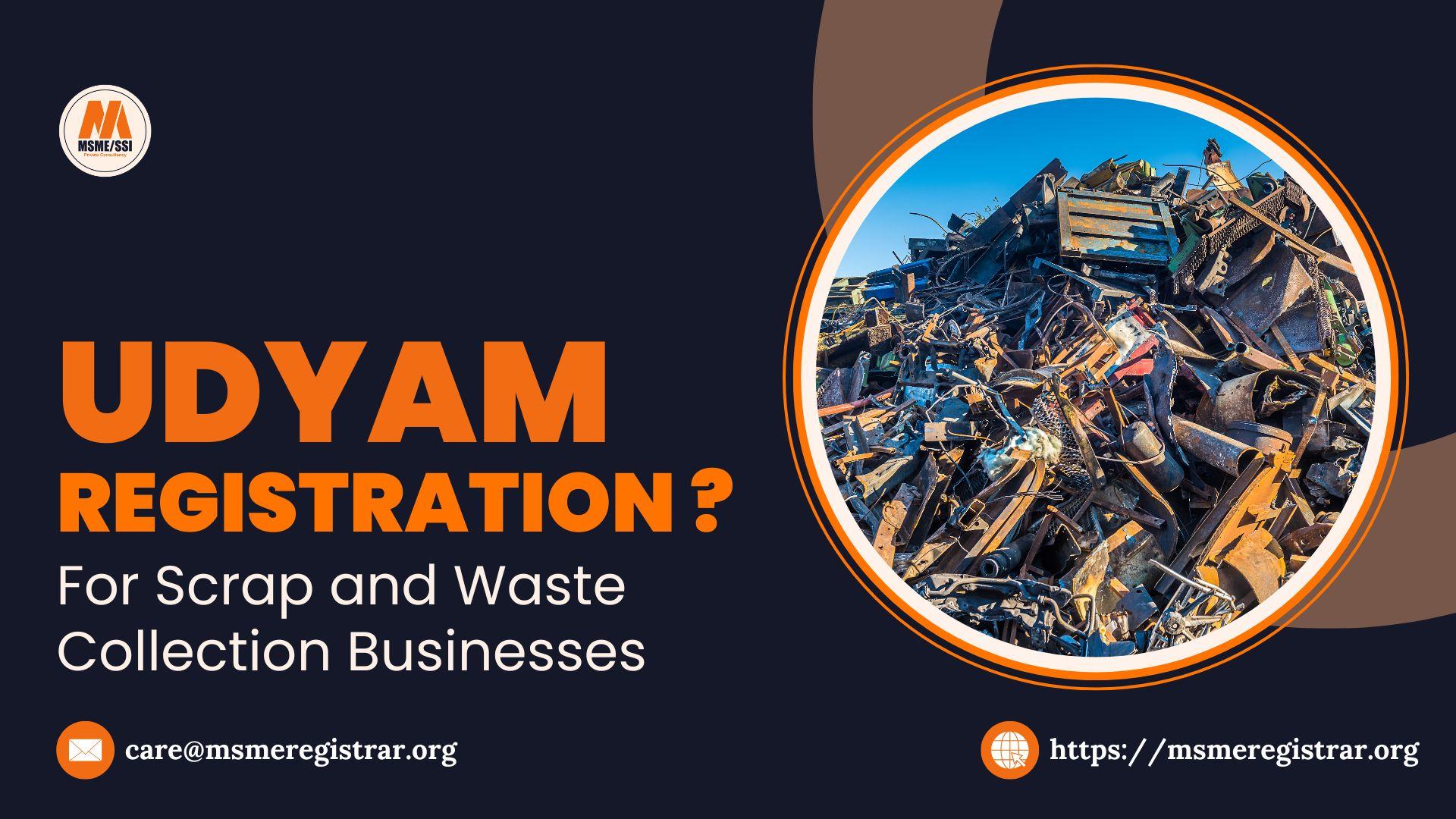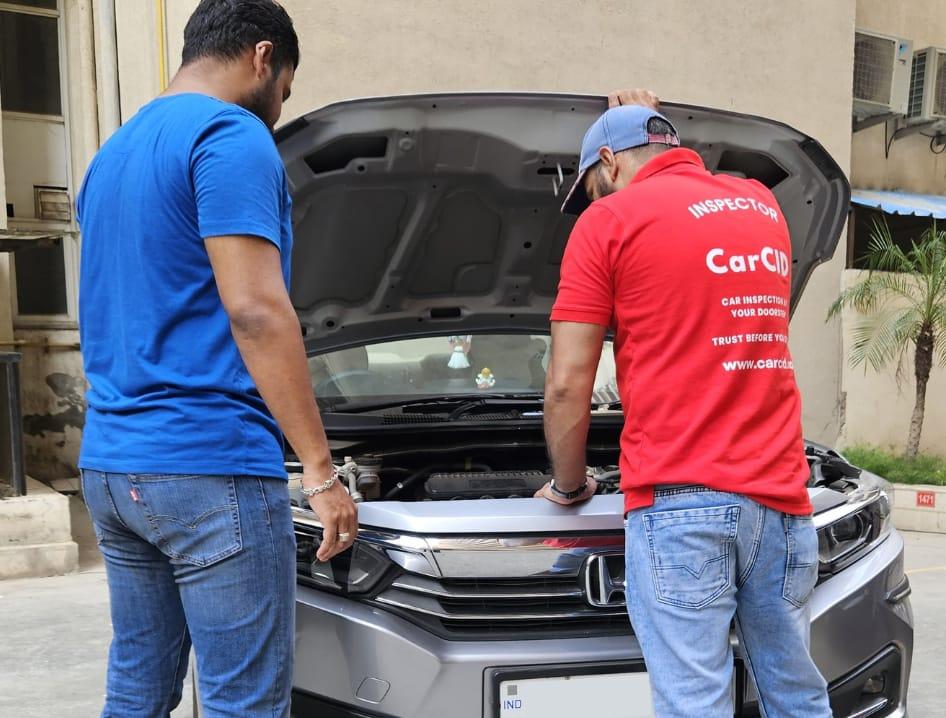Introduction
The scrap and waste collection industry plays a crucial role in sustainable waste management and environmental conservation. In recent years, as global awareness around waste reduction and recycling has grown, so has the importance of businesses operating in this space. India, with its extensive waste generation, has seen a rise in entrepreneurial initiatives aimed at managing and recycling waste. However, navigating the complexities of running a waste collection business can be challenging, particularly for small and medium-sized enterprises (SMEs) that face issues like limited funding, lack of technical knowledge, and an absence of formalized structures.
Understanding Udyam Registration
Udyam Registration is a government initiative designed to make it easier for MSMEs to operate in India. Introduced in July 2020, it replaced the older Udyog Aadhaar system with a more efficient and simplified registration process. The Udyam Registration portal enables businesses to register themselves online, which provides them with a unique identification number and an official certificate. This registration process is entirely paperless and does not require any additional fees, making it accessible to businesses of all sizes.
Benefits of Udyam Registration for Scrap and Waste Collection Businesses
Access to Financial Assistance and Loans
Udyam Registration allows businesses to access various government schemes, including low-interest loans and credit guarantee schemes. For scrap and waste collection businesses, which often require heavy initial investments in collection vehicles, processing equipment, and storage facilities, financial aid through loans or subsidies can be a game-changer. Registered businesses are also eligible for priority sector lending from banks, improving their chances of securing funds to scale operations.
Subsidies for Technological Upgradation
Technological advancements in waste processing can significantly improve efficiency and reduce costs. Udyam-registered businesses can benefit from schemes that provide subsidies for technological upgrades and support for innovation. Whether it’s for advanced sorting machinery, balers, or even recycling technologies, these subsidies help waste collection businesses enhance their capabilities and compete with larger players in the industry.
Ease of Compliance and Reduced Regulatory Burden
Waste collection and recycling businesses often face complex regulatory requirements, such as environmental permits and safety compliance. Udyam Registration offers MSMEs certain relaxations and simplifies regulatory processes, reducing the administrative burden on business owners. Additionally, registered businesses have an easier time participating in government tenders, as they are eligible for exemptions on Earnest Money Deposits (EMDs) and can benefit from price preference policies.
Market Access and Networking Opportunities
By registering with Udyam, businesses gain recognition as an MSME, allowing them to access government-led events, fairs, and exhibitions, which often have a reserved quota for MSMEs. For scrap and waste collection enterprises, these events provide an invaluable platform to showcase services, network with potential partners, and explore new business opportunities. Furthermore, Udyam-registered businesses are eligible to supply their services to government institutions under preferential conditions.
Increased Credibility and Customer Trust
Udyam Registration lends a layer of legitimacy and credibility to small businesses, making it easier to build customer trust. Clients, especially corporate ones, may prefer working with registered entities as it assures them of legal compliance. For scrap and waste collection businesses, this credibility can help establish long-term contracts with large organizations looking for reliable waste management partners.
Tax and Other Financial Benefits
Registered MSMEs can benefit from various tax exemptions and rebates that can ease financial constraints. For waste collection businesses, which may experience seasonal fluctuations in demand, tax relief during challenging financial periods can help maintain profitability. Udyam Registration also allows these businesses to access credit at lower interest rates, further supporting their cash flow management.
Impact of Udyam Registration on the Scrap and Waste Collection Sector
1. Formalization of the Sector
Scrap and waste collection is traditionally an informal industry in India, with many small operators working outside the regulatory framework. Udyam Registration encourages these operators to formalize their businesses, creating a more structured and accountable industry. This formalization allows businesses to access government support, while also contributing to better waste management systems and environmental conservation in India.
2. Job Creation and Skill Development
The waste collection industry is labor-intensive and requires a skilled workforce. Udyam Registration opens up opportunities for businesses to receive government support for skill development initiatives, enabling employees to acquire specialized training in areas like waste sorting, recycling, and waste management logistics. By formalizing employment within the sector, Udyam Registration helps improve working conditions, providing social security benefits and upskilling opportunities for workers.
3. Contribution to Sustainable Development Goals (SDGs)
The scrap and waste collection sector contributes directly to SDGs related to responsible consumption, climate action, and life on land and water. By supporting MSMEs in this industry, Udyam Registration indirectly promotes environmental sustainability. Formalized and efficient waste collection businesses can process and recycle waste more effectively, reducing landfill accumulation and minimizing pollution. This aligns with India’s commitment to reducing its environmental footprint and achieving sustainable growth.
4. Boosting Local Economies
Scrap and waste collection businesses often operate locally, collecting waste from households, commercial establishments, and industries within their communities. By registering under Udyam, these businesses can access government schemes aimed at fostering local entrepreneurship. This support strengthens the local economy, creates employment, and provides a stable income source for workers involved in waste management.
How to Apply for Udyam Registration
The Udyam Registration process is straightforward and accessible online. Business owners need to visit the Udyam Registration portal, where they can fill out an application form with basic business details, including Aadhaar number, PAN card, and bank information. Once submitted, a unique Udyam Registration number is generated, and the business is officially recognized as an MSME.
Key steps to remember:
Step 1: Visit the official Udyam Registration portal.
Step 2: Enter all necessary details, including your personal and business information like your name, mobile number, email address, enterprise address, Aadhaar information, bank account details, and business name.
Step 3: Verify the information and submit the application.
Step 4:Once the online application is successfully submitted, a payment window will appear.
Step 5: After payment, one of our team experts will contact you to guide you through the next steps.
Step 6: Once your Udyam certificate is generated, it will be sent to your registered email address.
Also Read,Udyam Registration and Its Role in Promoting Cross-Border Trade
Conclusion
Udyam Registration offers scrap and waste collection businesses a host of benefits that can enhance their efficiency, profitability, and sustainability. From financial assistance to regulatory support and tax benefits, Udyam Registration enables waste collection enterprises to focus on their core mission of managing waste and recycling materials effectively. By bringing these businesses into the formal sector, Udyam Registration promotes responsible waste management, supports local economic growth, and contributes to India’s broader environmental objectives.




